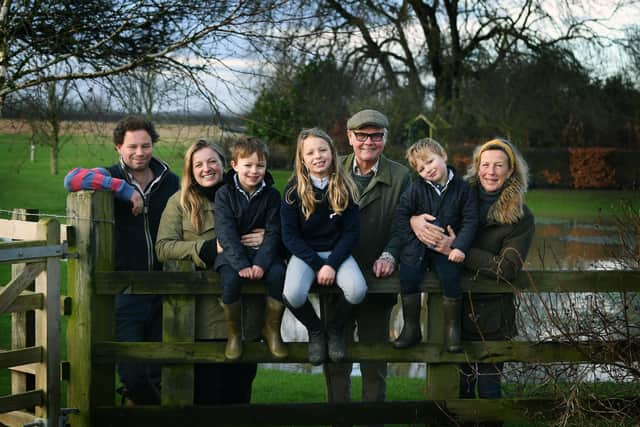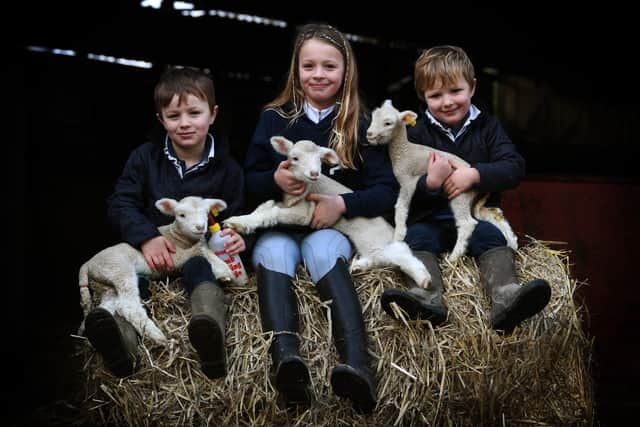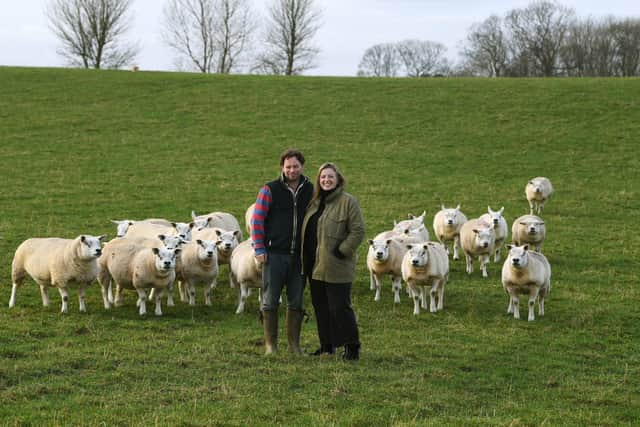Farm of the Week: Show champions who have constantly reinvented themselves to make a living from their land
It has clearly served him well as Geoff, his wife Jackie and son Christopher have altered their farming direction several times, and in the past year have picked up the Tye Trophy for the East Riding, a reserve champion at the Great Yorkshire Show and good prices for their pedigree cattle and sheep.
“It was Henry Fell who said you’ve got to follow the income stream,” says deep thinker Geoff. “You’ve got to do whatever it takes and for us our arable farming, livestock and conservation work is all integral to what we do and works together.
Advertisement
Hide AdAdvertisement
Hide AdThe Ribys’ farming enterprise runs to 1300 acres of which 275 acres is organic, and their mix today is cattle, sheep, crops and care for wildlife and the natural environment.


“It’s the second time we’ve won the Tye Trophy. We’ve always farmed with such as barley undersown with leys and grown stubble turnips. We’ve been in stewardship schemes for over twenty years.
“The farm has five ponds we’ve fenced and maintain. This year we’ve had eleven barn owl fledglings. We have put up plenty of boxes for tree sparrows and always leave headlands of barley for corn buntings. It’s all stuff farmers have been doing for years.
Geoff has always counted himself more of a livestock man, a passion shared by Christopher and Jackie, who has her own breed of sheep. One of the moves made was to come out of dairying.
Advertisement
Hide AdAdvertisement
Hide Ad“We came out of dairying 20 years ago. It had become apparent it wasn’t the best way to make a living here and Christopher wasn’t keen.


“We already had a few commercial heifers. I wanted a quality bull for them and bought a Beef Shorthorn from pedigree breeder Rob Paisley at Westmoor near Ilkley.
Over the years the Ribys have had considerable success showing their pedigree Beef Shorthorns and their herd now runs to 70 cows, having started with three pedigree cows from the Hon Gerald Turton of Upsall near Thirsk. They also have 40 commercial cows.
Geoff believes in showing, not for showing’s sake but as very much part of the business.
Advertisement
Hide AdAdvertisement
Hide Ad“We show our Beef Shorthorns at the Great Yorkshire Show. We had breed champion when the first UK Beef Shorthorn championship was held at Harrogate, which proved the start of a real success story, where they now get a tremendous number of entries. It is a tribute to the Yorkshire Agricultural Society of which I am a council member and the breed society of which I’ve been a director and president.


“Our main principle at Low Stonehills is to breed a good sound commercial animal and on top of that if you get some superior ones all well and good. We do sell some real quality bulls and in 2023 we sold two at 12,000 guineas each in Carlisle and Stirling. We have three going to Stirling next month.
“I often think that if you listen to consultants talking about arable crops, all they talk about is benchmarking. For me, taking livestock to shows is and always has been a form of benchmarking. Shows are a very important part of our business.
“We’ve 200 head on farm. Our commercials are all on the organic farm, with some Lincoln Reds that go to a Salers bull. We use a limited amount of AI, but mainly use bought-in bulls. We have two Shorthorn bulls at any one time and always high quality. We bought a good bull from the Hon Gerald seven years ago, Jason of Upsall. Our most recent Beef Shorthorn bull is from Major Gibb of Glenisla Beef Shorthorns.
Advertisement
Hide AdAdvertisement
Hide Ad“We fatten the bulk of our stock with a lot going as bull beef at 12-14 months. The commercial bullocks are sold the following summer as stores or fattened. Everything generally goes to Dawn Meats just two miles from us. We sell some where premiums are available for pasture fed native breeds.
Christopher is often seen in the show rings at the Great Yorkshire with Texel or Beltex sheep, but there are three breeds at Low Stonehills, as Geoff explains.
“We’ve Texels, which are Christopher’s, Jackie has Beltex and I have Poll Dorsets, which I’ve always found good to work with. We’ve won trophies for them as a flock, but we’ve not shown them.
Christopher tells of last year’s Great Yorkshire Show success.
Advertisement
Hide AdAdvertisement
Hide Ad“We did the best we’ve done with the Beltex. We had male champion and reserve breed champion.
“I buy Texel tups as part of a syndicate to get the very best, but we’ve also just bought some very good Beltex tups.
“Mum’s first tup was an aged ram Lake View Doozer three years ago from Carlisle and he has done a seriously good job. We took three Beltex tups to Carlisle in 2023 that sold at £7500 and £5500.
“We have 50 Texels, 17 Beltex and 50 Poll Dorsets, along with 60 recipient females as we do quite a bit of flushing. The Poll Dorsets lamb in January, the Texels and Beltex from the middle of February.
Advertisement
Hide AdAdvertisement
Hide AdWhile livestock is very much what the family is known for, it is the arable operation that provides its backbone, but as Geoff stresses, it is all, including their environmental work very much part of the whole.
“Our land type varies an awful lot, but is mostly fairly reasonable light to medium loam with some heavy land.
“We would like to think we can grow 4 tonnes of wheat per acre but things are never that simple, whether down to weather or as now, having to reduce inputs.
“We usually grow 260-270 acres of first wheats, currently the varieties Extase and Dawsum, plus some Cranium added this year.
Advertisement
Hide AdAdvertisement
Hide Ad“Dawsum is a bit of a shed filler,” says Christopher. “Extase can get you a bit of quality for biscuit. Winter barley is 120 acres of variety Tardis for feed. Our oilseed rape acreage usually now depends on if it gets flea beetle but is normally 150 acres. We grow towards 200 acres of oats that have been going to Quaker, and we’re growing beans for the first time this year. We also have about 50-60 acres of permanent pastures and 40 acres of leys for silage.
Geoff says the organic cropping has 40 acres of permanent pasture with the rest of the 275 acres a rotation of two years clover followed by winter wheat, spring oats, and spring barley variety Laureate, which normally would go to Muntons.
Geoff was born in the East Riding in Meaux Decoy, where the country lane from Meaux to Wawne has 26 bends. He started farming at Huttons Ambo near Malton where he farmed in partnership with Norman Kirkwood.
“A bit like the lane in Meaux, you have to go where you have to go, no matter how many bends there are. You’ve got to keep expanding your business whether it’s acreage or whatever, but just at this moment it isn’t that obvious which way to go.